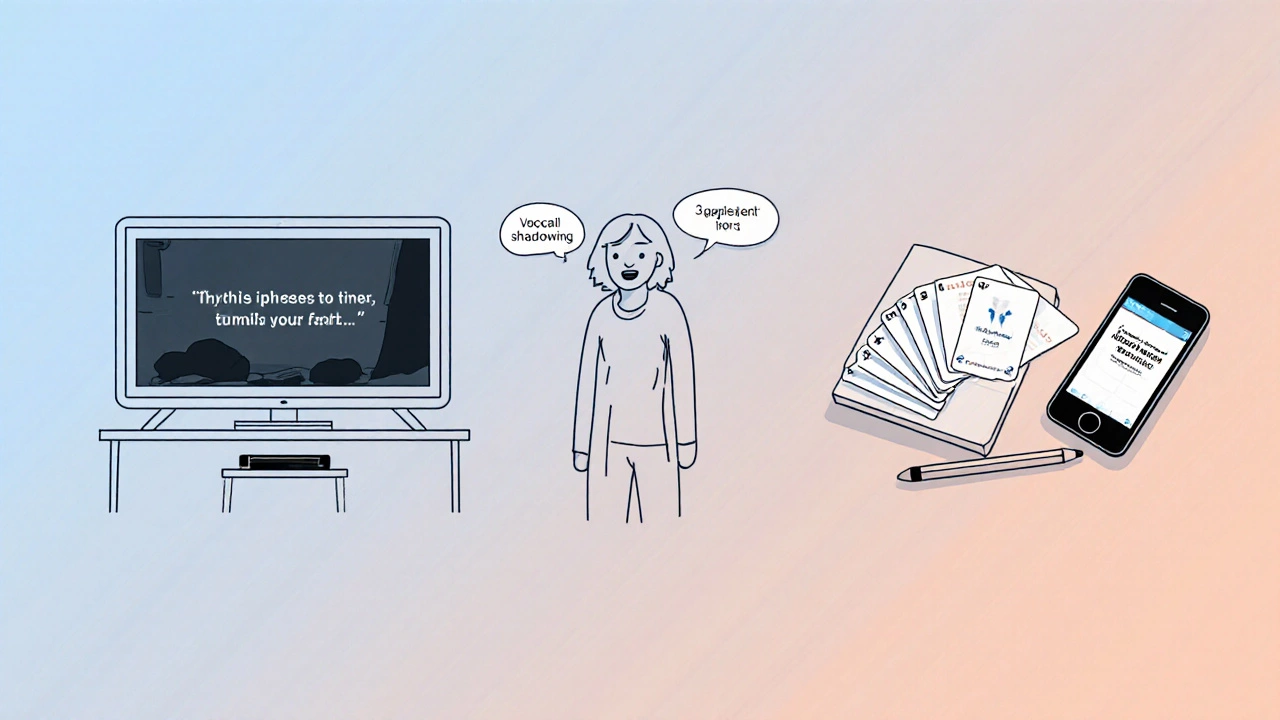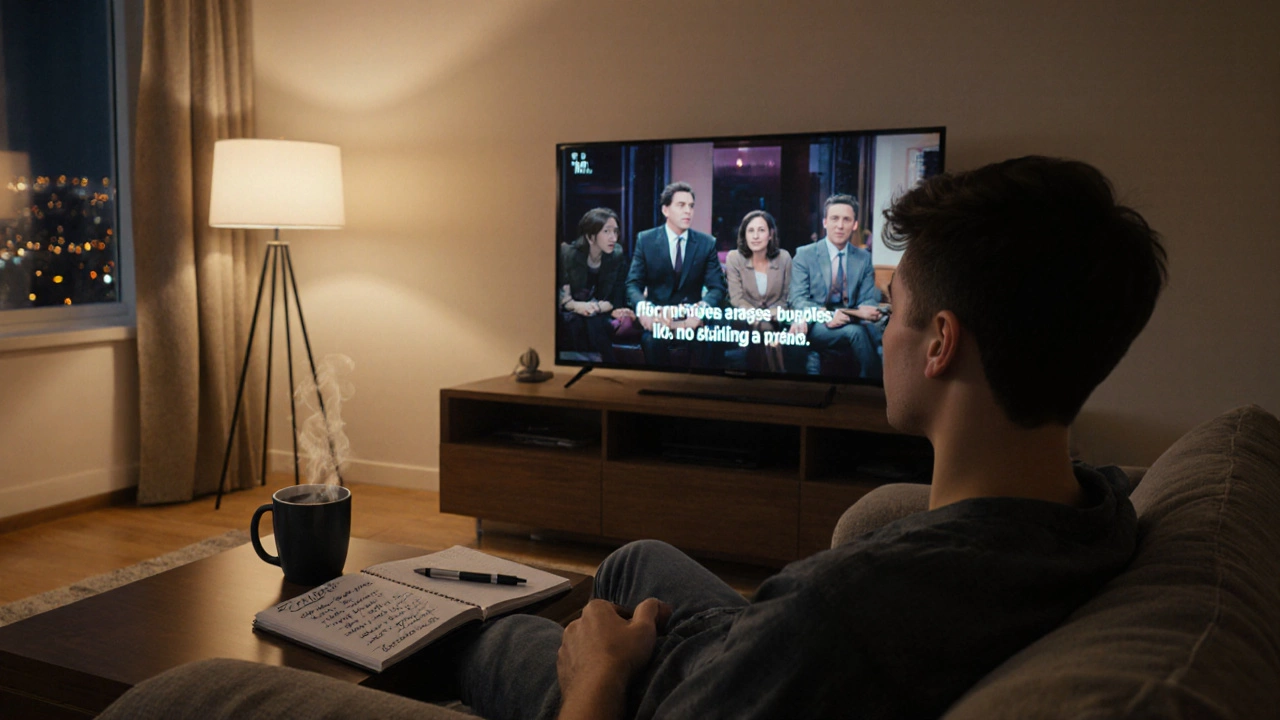TV Series Language Learning Selector
Select your current English level and preferred learning focus to find the best TV series for you!
Recommended Series for You
How It Works
This selector uses your English level and learning goals to recommend TV series that match your needs. Each recommendation includes details about accent, difficulty, and what you'll gain from watching.
Key Takeaways
- Choose shows with clear pronunciation and subtitles that match your level.
- Mix American and British series to hear different accents.
- Short, dialogue‑heavy episodes (20‑30 minutes) are ideal for focused listening.
- Use a three‑step method: watch, repeat, note new vocab.
- Regular, spaced viewing beats marathon binge‑watching for retention.
If you're hunting for the perfect English TV series to boost your language skills, you're in the right place. Watching TV isn’t just entertainment; it’s a low‑pressure way to hear real‑world English, pick up slang, and train your ear to different accents. Below you’ll find a practical guide that walks you from the why to the what, and finally how to turn binge‑watching into a language‑learning hack.
Why TV Series Work Better Than Textbooks for Speaking
Textbooks give you rules, but a TV show gives you context. When a character says "Let’s grab a coffee," you see the gesture, the tone, and the situation-all at once. That multi‑sensory input helps the brain create stronger memory links. Research from the University of Cambridge (2023) shows that learners who combine visual media with active note‑taking improve speaking fluency by up to 27% compared with textbook‑only study.
Series also expose you to everyday language: small talk, idioms, jokes, and cultural references you won’t find in a grammar drill. Because episodes are short, you can replay tricky parts without losing focus, something a 30‑minute lecture can’t offer.
How to Pick the Right Series for Your Level
Not every hit show is a language‑learning goldmine. Use these four criteria to filter options:
- Accent clarity: Clear enunciation (often American or neutral British) is easier for beginners.
- Pace of dialogue: Shows with moderate speaking speed let you catch words without pausing every few seconds.
- Subtitle support: Look for platforms that let you toggle English subtitles on and off.
- Topic relevance: Choose settings you find interesting-workplace, friendships, mystery-so you stay motivated.
Friends is a classic American sitcom that aired from 1994 to 2004, focusing on six friends living in New York City.
Why it’s great: The dialogue is conversational, the jokes are repeatable, and each episode runs about 22 minutes. Characters speak with a neutral American accent, making it a safe starting point for learners. Because the series is set in everyday situations-coffee shops, apartments, office meetings-you’ll hear vocab you can use the next day.

The Office (U.S.) is a mock‑documentary sitcom that follows the everyday lives of office employees at Dunder Mifflin.
Why it’s great: Workplace language and office‑jargon are front‑and‑center, perfect for anyone who needs English for professional settings. The “talking‑head” interview style slows down speech a bit, giving you extra processing time. Plus, the humor is rooted in cultural references, which helps you pick up idiomatic expressions.
Sherlock is a modern British adaptation of Sir Arthur Conan Doyle’s detective stories, starring Benedict Cumberbatch.
Why it’s great: If you’re ready for a challenge, Sherlock offers crisp British English, fast‑paced dialogue, and lots of deductive reasoning language (e.g., "observe," "deduce"). The series also gives you a taste of UK culture, helping you differentiate between American and British vocab.
Stranger Things is a sci‑fi horror series set in the 1980s, following a group of kids who encounter supernatural events.
Why it’s great: Teen slang, fast‑paced banter, and a mix of American accents make this a fun way to learn contemporary language. The show’s storytelling is gripping, so you’ll stay engaged long enough to absorb new words without feeling like you’re studying.
The Crown is a historical drama that chronicles the reign of Queen Elizabeth II, produced by Netflix.
Why it’s great: For learners aiming at formal or academic English, The Crown showcases precise diction, British etiquette, and a wealth of political and royal terminology. Each episode is longer (about 55 minutes), so it’s ideal for advanced learners who can handle sustained listening.

Quick Comparison of the Recommended Series
| Series | Accent | Difficulty | Episode Length | Best For |
|---|---|---|---|---|
| Friends | Neutral American | Beginner‑Intermediate | 22min | Everyday conversation |
| The Office (U.S.) | American | Beginner‑Intermediate | 22min | Workplace vocab |
| Sherlock | British (RP) | Intermediate‑Advanced | 80min | Analytical language |
| Stranger Things | American (regional) | Intermediate | 50min | Teen slang & pop culture |
| The Crown | British (Received Pronunciation) | Advanced | 55min | Formal & historical language |
How to Turn Watching Into Active Learning
- Start with subtitles: Play the episode with English subtitles. Pause after each scene and note down 3‑5 new words.
- Watch again without subtitles: Try to understand the dialogue using only your memory. This forces your brain to retrieve the vocabulary.
- Shadow the lines: Repeat sentences aloud, matching intonation and speed. Shadowing builds pronunciation and fluency.
- Create flashcards: Use a spaced‑repetition app (Anki, Quizlet) for the words you noted. Include a short example sentence from the show.
- Discuss the episode: Join online forums or a language‑exchange group and talk about the plot. Real‑world use cements retention.
Common Pitfalls & Pro Tips
Pitfall: Binge‑watching without reflection. You’ll absorb lots of words passively, but the retention rate plummets.
Pro tip: Limit yourself to one episode per day, then spend 15‑20 minutes reviewing notes before moving to the next.
Pitfall: Relying only on English subtitles. You may miss the spoken rhythm.
Pro tip: Switch to subtitles in your native language for the first watch only, then switch to English subtitles for the second pass.
Pitfall: Choosing a series that’s too easy or too hard. Either you’ll get bored or overwhelmed.
Pro tip: Rotate between a beginner‑friendly show (Friends) and a challenge (Sherlock) to keep the brain stimulated.
Frequently Asked Questions
Can I learn English by watching shows with my native‑language subtitles?
Yes, but only for the first viewing to grasp the plot. Switch to English subtitles for the second round so you start associating spoken words with their written forms, which speeds up vocabulary acquisition.
How many episodes should I watch per week for maximum retention?
Aim for 3‑4 episodes a week. This gives you enough exposure while leaving time for note‑taking, flashcard review, and spoken practice.
Do British shows help with American pronunciation?
They improve overall listening skills and expose you to a wider vowel range, but if your goal is a neutral American accent, balance your diet with a few U.S. series like Friends or The Office.
Is it okay to skip scenes that are hard to understand?
Instead of skipping, pause, replay, and look up unknown words. The effort builds listening stamina and expands vocabulary faster than glossing over difficult parts.
What if I don’t have a Netflix or HBO subscription?
Many of the recommended series are also available on free ad‑supported platforms (e.g., Peacock for The Office, YouTube clips for Friends). Look for legal streaming options that still provide English subtitles.
Next Steps
Pick one series from the table that matches your current level, set up subtitles, and follow the three‑step watch‑repeat‑note routine for the next two weeks. After that, add a second show with a different accent to broaden your ear. Keep a simple spreadsheet: Series, Episode, New Words, Review Date. When you see a steady increase in recall, you’ll know the method works.




